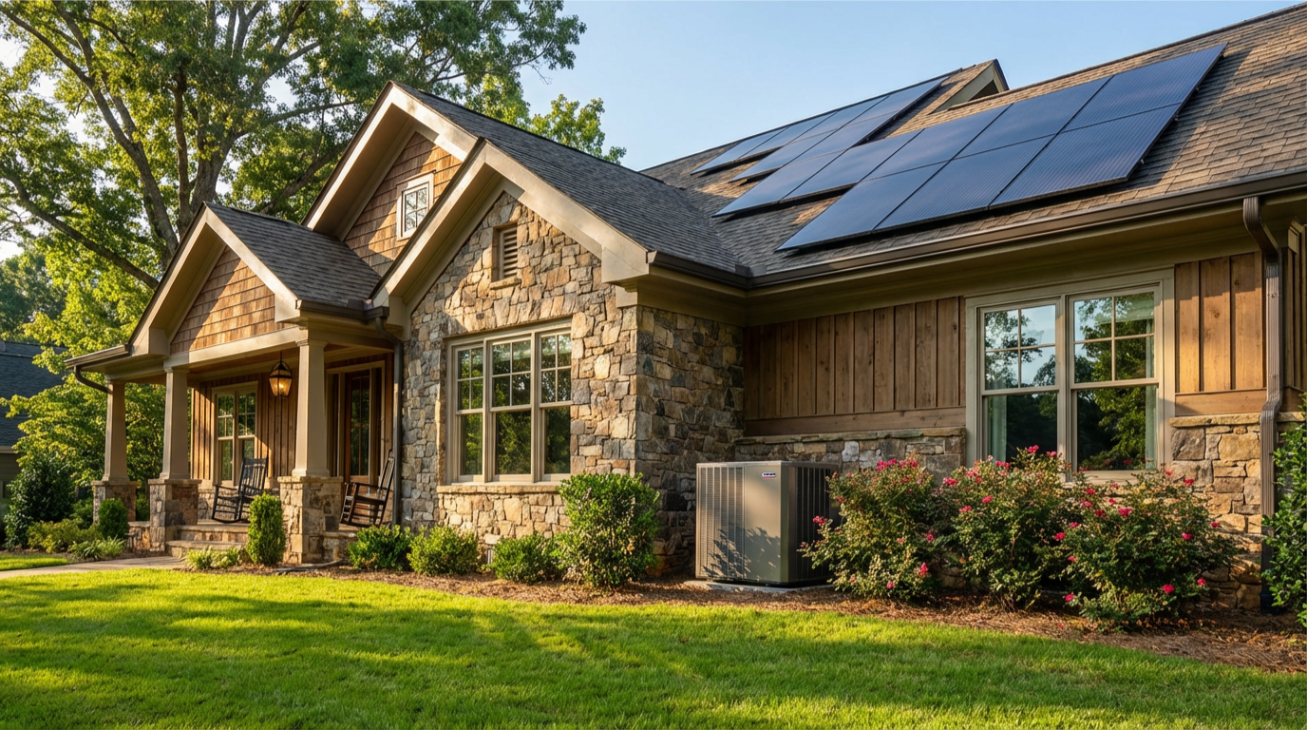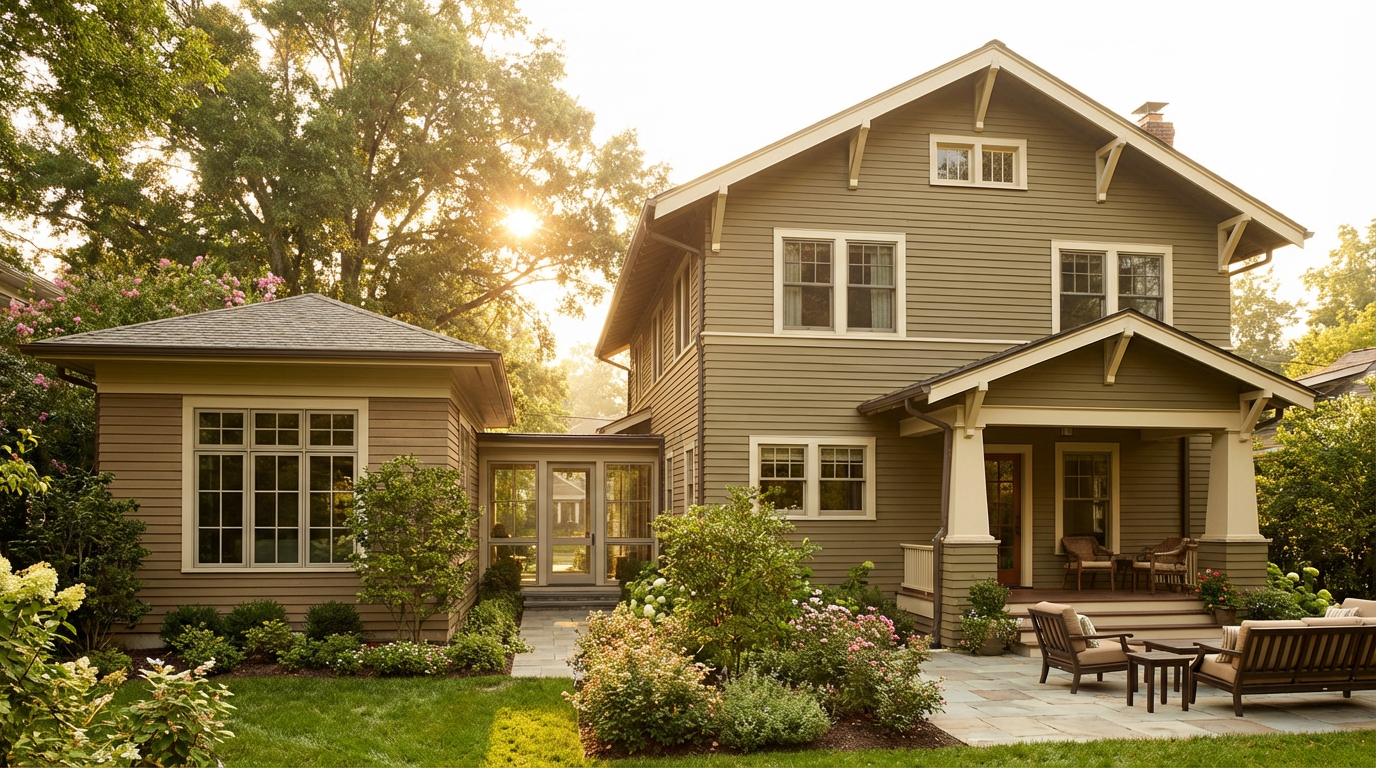A home addition permit in Georgia is required for any structural change that adds square footage to your house. All 159 Georgia counties require building permits for additions, with costs ranging from $325-$960 depending on project value and location. The permit process typically takes 2-4 weeks for plan review, plus inspections during construction.
Planning a home addition is exciting, but navigating Georgia’s building permit requirements can feel overwhelming. If you’re a Georgia homeowner ready to expand your living space, this comprehensive guide covers everything you need to know, from finding your local permit office to understanding costs and avoiding delays.
Georgia Home Addition Permit Requirements by County
One of the biggest challenges Georgia homeowners face is figuring out exactly which office handles their permits. Unlike many online resources that focus only on Atlanta, we’re covering the entire state.
Key Permitting Offices in Major GA Counties
Fulton County Building Permit Authority
- Covers Atlanta, Sandy Springs, Roswell, and Johns Creek
- Online portal: [e-permits.fultoncountyga.gov]
- Average processing time: 2-3 weeks for residential additions
- Known for strict energy code enforcement
Gwinnett County Department of Planning and Development
- Serves Lawrenceville, Duluth, Norcross, and Sugar Hill
- Thorough plan reviews with detailed structural requirements
- Requires detailed structural drawings for additions over 400 sq ft
- Fast-track options for pre-approved addition designs
DeKalb County Permits and Inspections
- Includes Decatur, Dunwoody, Tucker, and Stone Mountain
- Offers pre-application consultations ($150 fee)
- Known for environmental review requirements near streams
- Typical review time: 3-4 weeks
Cobb County Community Development Agency
- Covers Marietta, Smyrna, Kennesaw, and Acworth
- Strict setback requirements in established neighborhoods
- Requires zoning compliance verification letter
- Often requires landscaping plans for large additions
Hall County Building Inspection Department
- Serves Gainesville and surrounding Lake Lanier area (including Cumming)
- Special lake lot restrictions for waterfront properties
- Requires soil erosion permits for additions near water
- Mountain area wind load requirements
North Fulton County Areas
- Milton and surrounding equestrian communities
- Stricter architectural guidelines in historic districts
- Large lot requirements may affect addition placement
- Horse farm properties have special zoning considerations
Can’t find your county? Georgia has 159 counties, each with its own permitting authority. Rural counties may have part-time building departments with specific application days. Contact your local city hall or county courthouse for specific guidance or send us a message and we’d be happy to help!
Why Home Addition Permits Are Required in Georgia
Generally doesn’t matter what type of home addition you want, Georgia’s building permit system protects homeowners and maintains community safety standards across all 159 counties.
Ensuring Safety and Structural Integrity
Building permits ensure your addition meets Georgia’s specific building codes, which account for:
- Wind load requirements (120+ mph in coastal counties)
- Seismic considerations for North Georgia mountain areas
- Soil conditions specific to Georgia clay and coastal sandy soils
- Flood zone compliance in FEMA-designated areas
- Fire safety standards including proper egress from bedrooms
Complying with Georgia Zoning Laws and Building Codes
Georgia follows the International Residential Code (IRC) with state-specific amendments covering:
- Setback requirements (typically 10-25 feet from property lines)
- Maximum building height (usually 35 feet in residential zones)
- Lot coverage limitations (often 30-40% of total lot area)
- Parking requirements for additions that add bedrooms
- Stormwater management for additions over 500 sq ft
Protecting Your Property’s Value and Insurability
An unpermitted addition creates serious problems:
- Financing issues when selling (lenders won’t approve loans)
- Insurance claim denials for damage to unpermitted areas
- Tax assessment complications with county records
- Title insurance problems during property transfers

When is a Permit Required for Your Georgia Home Addition?
Projects That Almost Always Require a Residential Building Permit
- Room additions of any size that involve structural changes
- Second-story additions or expanding upward
- Kitchen expansions that move plumbing or electrical
- Bathroom additions (new bathrooms always require permits)
- Garage conversions to living space
- Sunroom or porch enclosures with permanent foundations
- Additions requiring new foundation work
Before committing to a costly addition, consider if basement remodeling might meet your space’s needs more affordably and with fewer permits required. For a stress-free home remodeling experience, it helps to plan your scope early.
Minor Remodeling Work That May Not Require a Permit
- Interior renovations without moving walls
- Replacing windows and doors of the same size
- Refinishing existing floors
- Painting and basic cosmetic updates
- Installing new cabinets in existing kitchen layout
When in doubt, call your local building department. A quick phone call can save you significant trouble later.
The Georgia Home Addition Permit Process
Step 1: Finalize Your Architectural Plans & Engineering Designs
Before you can apply, you need professional plans. In Georgia, plans for additions typically must be:
- Drawn to scale (usually 1/4″ = 1′)
- Stamped by a licensed architect or engineer for structural elements
- Include foundation details, framing plans, and electrical layouts
- Show compliance with energy code requirements
Step 2: Compile All Required Documents (Your Complete Checklist)
Site Plans & Surveys
- Plot plan showing existing structures and proposed addition
- Setback measurements from all property lines
- Utility line locations (call 811 before digging)
Architectural & Structural Drawings
- Floor plans showing existing and new construction
- Elevation drawings from all sides
- Cross-sections showing structural details
- Electrical and plumbing rough-in plans
Energy Efficiency Documentation
- Insulation specifications (minimum R-13 walls, R-30+ ceilings)
- Window and door U-factor ratings
- HVAC efficiency calculations
- Blower door test plan (required for additions over 50% of original floor area)
Completed Permit Application Form
- Property owner information
- Contractor license numbers (if applicable)
- Project description and estimated value
- Required signatures and notarization
Step 3: Submit Your Application to the Correct Local Authority
Most Georgia counties now accept applications online, but some still require in-person submission. Bring:
- Multiple copies of all plans (typically 3-4 sets)
- Completed application with required fees
- Proof of property ownership
- Contractor license verification
Step 4: The Plan Review and Revision Process
Plan review timing varies by county and season:
- Peak season (March-June): 3-4 weeks
- Slower periods (July-February): 2-3 weeks
- Holiday months (November-January): Up to 6 weeks
Common revision requests include:
- Structural beam sizing calculations
- HVAC load calculations for new spaces
- Electrical circuit capacity verification
- Energy code compliance details
Step 5: Permit Issuance and Scheduling Required Inspections
Once approved, you’ll receive your permit and inspection schedule. Georgia typically requires:
- Footing inspection before concrete is poured
- Foundation inspection after forms are set
- Framing inspection before covering walls
- Mechanical rough-in for HVAC, electrical, and plumbing
- Insulation inspection before drywall
- Final inspection before occupancy
Step 6: Final Approval and Certificate of Occupancy
After passing the final inspection, you’ll receive a Certificate of Occupancy (CO). This document is crucial for:
- Insurance coverage of the new space
- Refinancing or selling your home
- Proving the addition was built to code
Common Inspection Failures to Avoid:
- Missing smoke detectors in required locations
- Incorrect outlet spacing (outlets must be within 6 feet of each other)
- Inadequate insulation installation or missing vapor barriers
- Structural connections that don’t match approved plans
- HVAC systems not properly balanced or tested
How Much Do Home Addition Permits Cost in Georgia?
Key Factors That Influence Permit Fees
Project Valuation Method Most Georgia counties calculate fees based on construction value:
- Fulton County: $0.65 per $100 of construction value
- Gwinnett County: $0.75 per $100 of construction value
- Cobb County: $0.80 per $100 of construction value
Square Footage-Based Fees Some counties use square footage:
- DeKalb County: $0.12 per square foot for residential additions
- Minimum fees typically range from $75-150
Learn how much does a Home Addition cost per square foot
Example Permit Cost Structures from Different Georgia Counties
$50,000 Kitchen Addition Example:
- Fulton County: ~$325 in permit fees
- Gwinnett County: ~$375 in permit fees
- Cobb County: ~$400 in permit fees
- DeKalb County: ~$340 in permit fees
$120,000 Second-Story Addition Example:
- Fulton County: ~$780 in permit fees
- Gwinnett County: ~$900 in permit fees
- Cobb County: ~$960 in permit fees
- DeKalb County: ~$820 in permit fees
Need help calculating exact permit costs for your Georgia addition? Our team provides free permit cost estimates as part of our design consultation.
Budgeting for “Hidden” Costs
Survey Requirements Many Georgia counties require an updated survey showing:
- Current property boundaries and easements
- Existing structures and their setback distances
- Utility line locations and access points
- Cost: $300-800 depending on lot size and complexity
Engineering Stamps Georgia requires professional engineering for:
- Structural modifications to existing foundations
- Second-story additions over existing single-story homes
- Additions in high-wind coastal areas
- Cost: $500-1,500 for residential additions
Impact Fees Some Georgia municipalities charge impact fees:
- School impact fees for bedroom additions: $500-2,000
- Transportation impact fees for large additions: $300-1,000
- Water/sewer capacity fees: $200-800 per bathroom
Plan Revision Fees When counties require plan changes:
- Minor revisions (dimensions, details): $50-150
- Major revisions (structural changes): $200-500
- Resubmission after rejections: $100-300
Total permitting costs typically run 1-3% of your total project cost when you factor in all associated fees.

DIY Permitting vs. Hiring a Professional
The Pros and Cons of Managing the Permit Process Yourself
Advantages of DIY Permitting:
- Save on contractor markup for permit services
- Maintain direct control over the timeline
- Learn about your local building requirements
Challenges You’ll Face:
- Complex plan requirements and technical language
- Multiple trips to county offices during business hours
- Risk of costly mistakes or delays from incomplete applications
- Responsibility for scheduling and coordinating inspections
When You Are Legally Required to Hire a Licensed Contractor in Georgia
Georgia law requires licensed contractors for:
- Electrical work (must use licensed electrician)
- Plumbing modifications (licensed plumber required)
- HVAC installations (licensed HVAC contractor)
- Structural work over certain thresholds
Georgia Contractor License Requirements:
- General contractors need state licenses for projects over $2,500
- Specialty trades (electrical, plumbing, HVAC) require separate licenses
- Always verify licenses through the Georgia Secretary of State website
- If work doesn’t pass inspection, your contractor should correct issues and schedule re-inspection
Even if you can legally do the work yourself, many counties require professional plans stamped by licensed engineers or architects.
The Advantage: How a Design-Build Firm Simplifies Everything
Working with an experienced design-build contractor means:
- Single point of contact for design, permits, and construction
- Established relationships with local building departments across Georgia
- Experience avoiding common pitfalls that delay approval
- Professional plan preparation meeting all Georgia code requirements
- Coordinated inspection scheduling to keep your project moving
Why Georgia Homeowners Choose Professional Permit Services:
“I tried to handle the permits myself for our Alpharetta addition and got overwhelmed by Fulton County’s requirements. When we hired a contractor who knew the system, our revised application was approved in two weeks.” – Local homeowner experience
What Professional Permit Management Includes:
- Pre-design consultation to ensure addition meets all zoning requirements
- Professional architectural plans stamped by Georgia-licensed engineers
- Complete permit application preparation and submission
- Plan revision handling if county requests changes
- Inspection scheduling and coordination throughout construction
- Final certificate of occupancy acquisition
Let Artistic Construction Handle the Hassle
Our All-in-One Process: From Blueprints to Final Inspection
At Artistic Construction, we’ve streamlined the entire home addition process. Here’s how we make it stress-free:
- Initial Design Consultation – We listen to your vision and assess feasibility
- Professional Plan Development – Our team creates code-compliant plans
- Permit Application Management – We handle all paperwork and county interactions
- Construction & Inspection Coordination – We manage every phase from foundation to final approval
Save Weeks of Time and Avoid Costly Application Mistakes
Time Savings: Our established relationships with local building departments mean faster plan reviews and fewer revisions. Projects that might take homeowners 6-8 weeks to permit typically get approved in 3-4 weeks with our assistance.
Error Prevention: We’ve submitted hundreds of permit applications across Georgia. We know what each county looks for and how to prepare bulletproof applications that get approved the first time.
Leverage Our Experience with Local GA Permitting Offices
We maintain active relationships with building departments in:
- Fulton, Gwinnett, DeKalb, and Cobb counties
- Cherokee, Forsyth, and Hall counties
- Clayton, Douglas, and Henry counties
This local expertise means we understand each jurisdiction’s unique requirements and preferences.
Enjoy a Seamless Project with a Single Point of Contact
Instead of coordinating between architects, engineers, and contractors, you work directly with our project manager who handles all communications and scheduling. You’ll always know what’s happening and what comes next.
What Our Clients Say About Our Process
“Artistic Construction made what I thought would be a nightmare into a smooth experience. They handled all the permit paperwork while I focused on picking finishes. I never had to take time off work to visit the county office.” – Sarah M., Alpharetta
“The permit process was completely transparent. They explained every step and kept us informed of progress. When the inspector requested a minor plan revision, they handled it immediately.” – Mike R., Lawrenceville
The Risks: What Happens If You Build an Addition Without a Permit in GA?
Penalty for Building Without a Permit: Fines and Stop-Work Orders
Georgia counties take unpermitted construction seriously. Typical penalties include:
- Fines ranging from $100-500 per violation
- Stop-work orders halting all construction
- Double permit fees for after-the-fact applications
- Daily fines until violations are corrected
The Nightmare Scenario: Forced Demolition of Unpermitted Work
In extreme cases, especially for additions that violate setback requirements or structural codes, counties can order demolition. This means:
- Complete loss of construction investment
- Restoration of property to original condition at your expense
- Potential legal action for code violations
Future Complications When Selling Your Home
Unpermitted additions create problems during real estate transactions:
- Buyer financing difficulties when lenders discover code violations
- Reduced property value due to uncertainty about addition safety
- Required retroactive permitting that can delay or kill sales
- Insurance complications that may void coverage
The bottom line: permit fees are always cheaper than fixing unpermitted work later.
Special Considerations for Georgia Home Additions
Homeowners Association (HOA) Approvals
If your property is part of an HOA, you must obtain architectural approval before applying for county permits. This process typically involves:
- Submitting architectural plans to your HOA review committee
- Waiting 30-60 days for approval (some HOAs meet monthly)
- Paying HOA review fees (typically $100-500)
- Meeting community design standards for materials and colors
Tip: Start your HOA approval process immediately after finalizing your design. This runs parallel to your county permit application preparation.
Setback Variances and Special Exceptions
When You Need a Variance: If your addition doesn’t meet minimum setback requirements, you’ll need a variance from your local zoning board before getting a building permit.
Variance Process:
- Public hearing required (neighbors are notified)
- Additional fees ($500-1,500 depending on county)
- 30-60 day timeline
- No guarantee of approval
Alternatives to Variances:
- Reduce addition size to meet setbacks
- Consider building up instead of out
- Explore bump-out designs that stay within setback limits
Utility Coordination Requirements
Before Breaking Ground:
- Call 811 (Georgia 811) at least 3 business days before excavation
- Notify your utility companies about electrical service changes
- Coordinate with gas company if moving or adding gas lines
- Contact water/sewer department for new bathroom additions
Potential Utility Upgrades:
- Electrical panel upgrades for additional circuits
- Gas meter relocation if addition blocks access
- Water service upgrades for multiple new bathrooms
- Septic system evaluation for additional bedrooms
Working Hours and Neighbor Relations
Georgia Construction Hours: Most counties allow construction Monday-Saturday, 7 AM to 6 PM. Sunday work typically requires special permits and neighbor notification.
Noise Ordinances:
- No power tools before 7 AM or after 6 PM on weekdays
- Saturday work often ends at 5 PM
- Check your specific county’s noise ordinance
Neighbor Communication Tips:
- Introduce your contractor to immediate neighbors
- Share project timeline and major construction phases
- Provide contact information for project manager
- Address concerns promptly to maintain good relationships
Avoiding Common Permit Delays in Georgia
Most Common Causes of Delays:
- Incomplete Applications – Missing signatures, incorrect fees, or missing required documents
- Inaccurate Surveys – Plans based on old property surveys that don’t reflect current conditions
- Structural Engineering Issues – Beam calculations that don’t account for Georgia’s wind/seismic loads
- Energy Code Compliance – Missing details about insulation, windows, or HVAC efficiency
- Setback Violations – Plans that encroach on required property line setbacks
Pro Tips to Avoid Delays:
- Get a new survey if yours is more than 2 years old
- Submit complete applications with all required documents on the first try
- Use local engineers familiar with Georgia soil conditions and requirements
- Include detailed drawings showing exactly how new construction connects to existing
- Schedule pre-application meetings with building department staff for complex projects
Solar and Renewable Energy Considerations
If your addition includes solar panels or other renewable energy systems:
Separate Solar Permits:
- Electrical permit for interconnection to your home’s electrical system
- Structural review to ensure roof can support panel weight
- Utility coordination with Georgia Power or your electric cooperative
- Net metering agreement if selling excess power back to the grid
Timeline Considerations: Solar permits can add 2-4 weeks to your overall timeline, so plan accordingly.
Accessibility and ADA Compliance
When ADA Requirements Apply: While single-family home additions typically don’t require full ADA compliance, consider accessibility features if:
- Anyone in your household has mobility limitations
- You’re planning to age in place
- Your addition includes a rental unit or in-law suite
Practical Accessibility Features:
- Wider doorways (36″ minimum)
- Zero-step entries from addition to existing home
- Accessible bathroom fixtures if adding bathrooms
- Proper lighting and electrical outlet heights
Ready to move forward with your Georgia home addition? At Artistic Construction, we handle every detail from initial design through final inspection, eliminating the stress and complexity of navigating Georgia’s permit requirements.
Schedule Your Free Design & Permit Strategy Session today. We’ll review your project goals, explain the specific requirements for your location, and provide a clear timeline and budget estimate, all with no obligation.
What You’ll Get in Your Free Session:
- Property assessment for addition feasibility
- Permit requirement overview for your specific county
- Preliminary timeline with key milestones
- Budget estimate including all permit and hidden costs
- Design recommendations to avoid common permit delays
Serving homeowners throughout Metro Atlanta and North Georgia with expert design-build services and hassle-free permitting since 2015.
Frequently Asked Questions About Georgia Home Addition Permits
Can I start construction while my permit is under review?
No. Construction cannot begin until you have an approved permit in hand. Starting early can result in fines and stop-work orders.
What happens if my permit expires during construction?
Georgia building permits expire after 6 months of inactivity. You can apply for a permit extension before it expires (usually costs $50-100) or obtain a new permit if too much time has passed.
Do I need separate permits for electrical and plumbing work?
Most counties include basic electrical and plumbing in the building permit. However, major electrical panel upgrades or significant plumbing rerouting may require separate trade permits.
Can I modify my plans after permit approval?
Minor changes may be approved with a plan amendment. Major changes require a new permit application and review process.
Can I do my own electrical work in Georgia?
Homeowners can do electrical work in their own residence, but it must be inspected. However, many insurance companies prefer licensed electrician work, and some counties have restrictions.
Should my contractor pull the permits or should I?
Either approach works, but contractor-pulled permits often process faster due to their established relationships with building departments.




